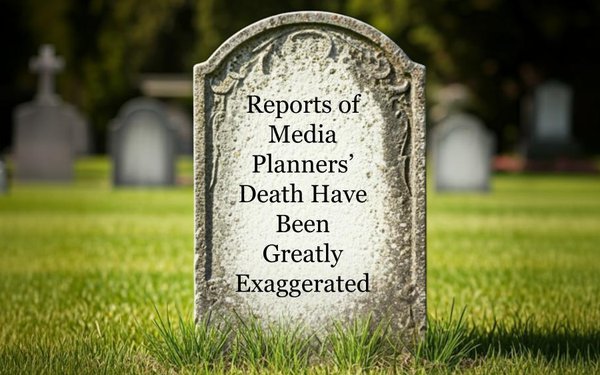
The robots are coming
for media planners, or so claimed a recent "Planning & Buying Insider"
column.
As CEO of an independent media agency, I can assure you the obituary for human-led media planning is premature. Don’t misunderstand me – at my shop we work with all the
major ad tech platforms and we’ve fully embraced AI-powered planning and research tools, but in today's incredibly complex media ecosystem the role of the media planner as strategic
advisor is more important than ever.
The sophistication of today’s platforms and the rapid advancement of AI is undeniable. Tools from Google, Meta, and others can
process vast amounts of data at speeds no human can match, synthesizing audience insights and media mix modeling in minutes rather than days.
advertisement
advertisement
But efficiency is not strategy, and automation is
not understanding. Over-reliance on technology ignores a crucial reality: algorithms can't negotiate the messy, nuanced, world of brand-building. Tools like Google's Meridian are truly impressive, but
they're essentially playing in their own sandbox.
I can tell you firsthand there is no magic wand that perfectly orchestrates linear, CTV, social, search and out-of-home (OOH). These siloed
platforms have friction. Brands need partners with fiduciary accountability to help them navigate across these platforms.
Each tech platform speaks its own language, measures success
differently, and yes, sometimes steps on each other’s toes. It’s why having a media planning advocate and partner that has lived and breathed these day-to-day challenges truly matters. We
need AI, absolutely, but we also need smart, experienced planners and strategists who understand how all these pieces work together in the real world.
Getting ads efficiently in front of
eyeballs is table stakes. The trick is building a cross–channel campaign that breaks through, rather than contributes to media clutter and that helps deliver a client’s business KPIs. Can
a platform understand what is keeping our clients up at night or understand why a specific brand needs to show up differently in Milwaukee vs. Miami?
Real omnichannel planning
isn’t just about checking every box. I’ve seen how the magic happens when channels work together in ways that platforms can’t calculate. Meta can optimize your Insta ads, and Google
can fine-tune search strategy. But knowing when TV needs to amplify social, or how OOH can spark a digital conversation comes from years of navigating media channels in the real world. It’s
messy, complex, and if you love it like we do, it’s exhilarating.
I've been fortunate to see the industry from both sides. In a past life I was a marketer at Subway and
P&G. Now, I lead our team of 100-plus at Mediassociates. One thing I can say with certainty is that media planning isn’t just a math equation, it’s a strategy and approach for how to
connect people with brands.
Great ad creative tells the story, and media delivers the message with impact and emotion. I’ve watched our teams work side-by-side with our clients to build
plans that piece together all the nuanced puzzle pieces – creative messaging, cultural moments, consumer sentiment, business realities – that make a successful media campaign in ways that
just can’t be automated. As an independent agency, we’re free to be true advisors. No strings attached, no pre-purchased inventory to push, no broader holding company
agenda.
Let me be candid about where I think we are headed. Smart ad tech platforms' AI tools are a game-changer, but not a game-ender. It’s going to liberate talented
planners from the spreadsheet grind, and I welcome that.
But what keeps me excited is the breakthroughs that come from those “a-ha” moments in strategy sessions, building
partnerships with our client and truly understanding their business. And from seeing connections that algorithms just can’t grasp yet.
That's not AI vs. humans. It's AI making
experienced humans even better at what they do best: creating market-moving moments that transform brands.